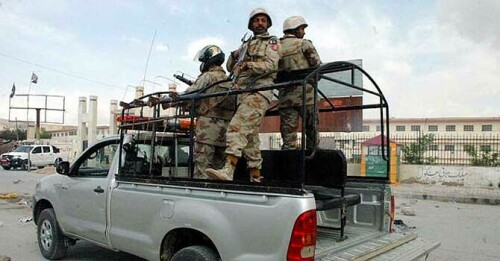ISLAMABAD: The Supreme Court suspended on Monday the Balochistan High Court’s order prohibiting all forms of protest and assembly by teachers and clerks for their demands.
Hearing an appeal filed by Habibur Rehman Mardanzai, secretary general of the Government Teachers Association, Balochistan, a three-judge bench headed by Justice Gulzar Ahmed suspended the BHC order of Dec 9, 2015, and postponed further proceedings for a date to be announced later.
The high court had held that laws relating to conduct, efficiency and discipline did not recognise strikes organised by the associations of employees of the government or statutory bodies. It termed the strikes not only a violation of the Constitution and the law, but also an infringement of the right of citizens to be dealt with in accordance with the law.
The order had come amid strikes called by teachers demanding promotion to fill vacant posts in secondary schools in accordance with the Balochistan Education Department Services Rules of 1981.
Counsel says freedom of assembly is essential element of democratic set-up
The BHC said the authorities concerned were remiss in discharging their constitutional and moral duties to take action against those indulging in illegal strikes. Instead, the authorities behaved like a tamed and subservient bureaucracy, it said.
It stated that going on strikes in educational institutions and healthcare centres and holding sit-ins on public thoroughfares were infringement of fundamental rights of citizens under Article 9 of the Constitution.
Representing the petitioner before the Supreme Court, rights activist Asma Jahangir asked whether the high court, while exercising its jurisdiction under Article 199, could assume suo motu powers restricted to the apex court in its original jurisdiction under Article 184(3).
The appeal pleaded that there was no record of breach of peace or disturbance of public order, nor had the executive taken any action against the protest held by teachers.
Citing a number of judgments, the counsel argued that holding a demonstration was a fundamental right under Article 16 which provided that every citizen had the right to assemble peacefully, and without arms, subject to any reasonable restrictions imposed by the law in the interest of public order.
She said the holding of demonstration and freedom of assembly were essential elements in a democratic set-up.
Such a right had to be construed liberally and given full effect until a reasonable restriction on it was imposed by law in the interest of public order, the petition said. Such a sacred and inalienable right cannot be abridged or restricted, nor can it be allowed to be construed or termed an offence of unlawful assembly.
A right guaranteed in the Constitution could not be translated as a crime because a mere apprehension or fear in the mind of a citizen of it being labelled as such would amount to a negation and denial of the right, weakening the concepts of civil liberty, freedom of expression, freedom of assembly etc and erode the institution of democracy, it said.
The exercise of a fundamental right by citizens could not justifiably be made a ground for registering an FIR against them, the petition said.
The high court order, the counsel argued, had arbitrarily and disproportionately imposed a ban on the freedom of assembly of teachers and clerks, which was discriminatory and violated their basic rights.
The directive issued by the high court to the authorities was also illegal because they were not bound to take action against every protest held by teachers and clerks, the petition said, adding that the BHC had assumed that they belonged to essential services and there was a ban on their freedom of assembly.
Published in Dawn, February 9th, 2016














































Dear visitor, the comments section is undergoing an overhaul and will return soon.